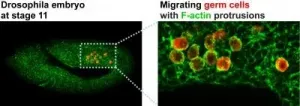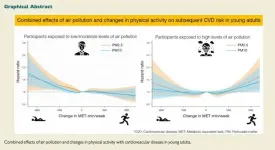Fasting acts as diet catalyst
2021-03-30
(Press-News.org) One in four Germans suffers from metabolic syndrome. Several of four diseases of affluence occur at the same time in this 'deadly quartet': obesity, high blood pressure, lipid metabolism disorder and diabetes mellitus. Each of these is a risk factor for severe cardiovascular conditions, such as heart attack and stroke. Treatment aims to help patients lose weight and normalise their lipid and carbohydrate metabolism and blood pressure. In addition to exercise, doctors prescribe a low-calorie and healthy diet. Medication is often also required. However, it is not fully clear what effects nutrition has on the microbiome, immune system and health.
A research group led by Dr Sofia Forslund and Professor Dominik N. Müller from the Max Delbrück Center for Molecular Medicine in the Helmholtz Association (MDC) and the Experimental and Clinical Research Center (ECRC) has now examined the effect a change of diet has on people with metabolic syndrome. The ECRC is jointly run by the MDC and Charité Universitätsmedizin Berlin. "Switching to a healthy diet has a positive effect on blood pressure," says Andras Maifeld, summarising the results. "If the diet is preceded by a fast, this effect is intensified." Maifeld is the first author of the paper, which was recently published in the journal "Nature Communications".
Broccoli over roast beef
Dr Andreas Michalsen, Senior Consultant of the Naturopathy Department at Immanuel Hospital Berlin and Endowed Chair of Clinical Naturopathy at the Institute for Social Medicine, Epidemiology and Health Economics at Charité - Universitätsmedizin Berlin, and Professor Gustav J. Dobos, Chair of Naturopathy and Integrative Medicine at the University of Duisburg-Essen, recruited 71 volunteers with metabolic syndrome and raised systolic blood pressure. The researchers divided them into two groups at random.
Both groups followed the DASH (Dietary Approach to Stop Hypertension) diet for three months, which is designed to combat high blood pressure. This Mediterranean-style diet includes lots of fruit and vegetables, wholemeal products, nuts and pulses, fish and lean white meat. One of the two groups did not consume any solid food at all for five days before starting the DASH diet.
On the basis of immunophenotyping, the scientists observed how the immune cells of the volunteers changed when they altered their diet. "The innate immune system remains stable during the fast, whereas the adaptive immune system shuts down," explains Maifeld. During this process, the number of proinflammatory T cells drops, while regulatory T cells multiply.
A Mediterranean diet is good, but to also fast is better
The researchers used stool samples to examine the effects of the fast on the gut microbiome. Gut bacteria work in close contact with the immune system. Some strains of bacteria metabolise dietary fibre into anti-inflammatory short-chain fatty acids that benefit the immune system. The composition of the gut bacteria ecosystem changes drastically during fasting. Health-promoting bacteria that help to reduce blood pressure multiply. Some of these changes remain even after resumption of food intake. The following is particularly noteworthy: "Body mass index, blood pressure and the need for antihypertensive medication remained lower in the long term among volunteers who started the healthy diet with a five-day fast," explains Dominik Müller. Blood pressure normally shoots back up again when even one antihypertensive tablet is forgotten.
Blood pressure remains lower in the long term - even three months after fasting
Together with scientists from the Helmholtz Centre for Infection Research and McGill University, Montreal, Canada, Forslund's working group conducted a statistical evaluation of these results using artificial intelligence to ensure that this positive effect was actually attributable to the fast and not to the medication that the volunteers were taking. They used methods from a previous study in which they had examined the influence of antihypertensive medication on the microbiome. "We were able to isolate the influence of the medication and observe that whether someone responds well to a change of diet or not depends on the individual immune response and the gut microbiome," says Forslund.
If a high-fibre, low-fat diet fails to deliver results, it is possible that there are insufficient gut bacteria in the gut microbiome that metabolise fibre into protective fatty acids. "Those who have this problem often feel that it is not worth the effort and go back to their old habits," explains the scientist. It is therefore a good idea to combine a diet with a fast. "Fasting acts as a catalyst for protective microorganisms in the gut. Health clearly improves very quickly and patients can cut back on their medication or even often stop taking tablets altogether." This could motivate them to stick to a healthy lifestyle in the long term.
INFORMATION:
The Max Delbrück Center for Molecular Medicine (MDC)
The Max Delbrück Center for Molecular Medicine in the Helmholtz Association (MDC) was founded in Berlin in 1992. It is named for the German-American physicist Max Delbrück, who was awarded the 1969 Nobel Prize in Physiology and Medicine. The MDC's mission is to study molecular mechanisms in order to understand the origins of disease and thus be able to diagnose, prevent and fight it better and more effectively. In these efforts the MDC cooperates with the Charité - Universitätsmedizin Berlin and the Berlin Institute of Health (BIH) as well as with national partners such as the German Center for Cardiovascular Research and numerous international research institutions. More than 1,600 staff and guests from nearly 60 countries work at the MDC, just under 1,300 of them in scientific research. The MDC is funded by the German Federal Ministry of Education and Research (90 percent) and the State of Berlin (10 percent), and is a member of the Helmholtz Association of German Research Centers. http://www.mdc-berlin.de
Scientific contacts
Dr. Sofia Forslund
Head of Host-microbiome factors in cardiovascular disease Lab
Max Delbrück Center for Molecular Medicine in the Helmholtz Association (MDC)
sofia.forslund@mdc-berlin.de
Dr. Andras Maifeld
Max Delbrück Center for Molecular Medicine in the Helmholtz Association (MDC)
Tel.: +49 30 450540558
andras.maifeld@mdc-berlin.de
ELSE PRESS RELEASES FROM THIS DATE:
2021-03-30
Researchers at KU Leuven (Belgium) have succeeded for the first time in measuring brain waves directly via a cochlear implant. These brainwaves indicate in an objective way how good or bad a person's hearing is. The research results are important for the further development of smart hearing aids.
A cochlear implant enables people with severe hearing loss to hear again. An audiologist adjusts the device based on the user's input, but this is not always easy. Think of children who are born deaf or elderly people with dementia. They have more difficulty assessing and communicating ...
2021-03-30
Artificial Intelligence is now capable of generating novel, functionally active proteins, thanks to recently published work by researchers from Chalmers University of Technology, Sweden.
"What we are now able to demonstrate offers fantastic potential for a number of future applications, such as faster and more cost-efficient development of protein-based drugs," says Aleksej Zelezniak, Associate Professor at the Department of Biology and Biological Engineering at Chalmers.
Proteins are large, complex molecules that play a crucial role in all living cells, building, modifying, and breaking down other molecules naturally inside our cells. They are also widely used in industrial processes and products, and in our daily lives.
Protein-based drugs are very common - the diabetes drug ...
2021-03-30
Working with fruit flies, scientists at Johns Hopkins Medicine say they have identified a new molecular pathway that helps steer moving cells in specific directions. The set of interconnected proteins and enzymes in the pathway act as steering and rudder components that drive cells toward an "intended" rather than random destination, they say.
In a report on the work, published March 2 in Cell Reports, these same molecular pathways, say the scientists, may drive cancer cells to metastasize or travel to distant areas of the body and may also be important for understanding how cells assemble and migrate in an embryo to form organs and other structures.
The team of scientists was led by Deborah Andrew, Ph.D., professor of cell biology and associate director for faculty development for ...
2021-03-30
Physical activity is important in preventing heart and blood vessel disease in young people so long as they don't undertake very strenuous activity on days when air pollution levels are high, according to a nationwide study of nearly 1.5 million people published today (Tuesday) in the European Heart Journal [1].
Until now, little has been known about the trade-offs between the health benefits of physical activity taking place outdoors and the potentially harmful effects of air pollution. Previous research by the authors of the current study had investigated the question in middle-aged people at a single point in time, but this is the first time that it has been investigated in people aged between 20-39 years over a period of several years. In addition, the researchers wanted to ...
2021-03-30
Scientists have identified three genes associated with an increased risk of developing cervical cancer.
The study, led by scientists from Imperial College London and published in the journal The Lancet Oncology, studied data from over 150,000 European women.
The research is one of the first studies to pinpoint genetic variants associated with an increased risk of cervical precancer and cancer.
The study team say the findings open avenues for identifying women at higher risk and monitoring their health more closely - particularly if genetic information is ...
2021-03-30
Markers of the pandemic's impact - testing rates, positivity ratio (cases among total tests), case rates by overall population and deaths - are clustered in neighborhoods, with low-income and predominantly minority communities experiencing worse outcomes than wealthier and predominantly white neighborhoods. The findings, part of the first research to look at comprehensive neighborhood-level data from March through September 2020 from three large U.S. cities - Chicago, New York and Philadelphia - were published today in Annals of Internal Medicine by researchers from Drexel University's Dornsife School of Public Health.
The ...
2021-03-29
March 29, 2021 - Acute kidney injury (AKI) occurred in nearly 20 percent of patients who underwent surgery with implantation of antibiotic-loaded "spacers" and intravenous (IV) antibiotics for the treatment of deep infections after total knee arthroplasty, reports a study in The Journal of Bone & Joint Surgery. The journal is published in the Lippincott portfolio in partnership with Wolters Kluwer.
Patients with preexisting chronic kidney disease (CKD) are at particularly high risk of AKI, according to the new research by Matthew P. Abdel, MD, and colleagues of the Mayo Clinic, Rochester, Minn.
High doses of antibiotics in bone cement linked to higher ...
2021-03-29
Paris, Nairobi, London, 29 March 2021 - Five major cooling suppliers are racing to net zero but they represent fewer than ten per cent of the 54 suppliers assessed in a new report, meaning the industry has a lot of work to do to catch up on climate action and reduce pollution from the sector, currently estimated at 7% of global greenhouse gas emissions.
With the world still falling short of meeting the Paris Agreement goals of holding global temperature rise this century to under 2 degrees C, and pursue 1.5 degrees C, action to reduce the climate impact of cooling will be essential.
According to the International Energy Agency, emissions from cooling are expected to double by 2030 and triple by 2100, driven by heat waves, population growth, urbanization, and a growing middle ...
2021-03-29
A new study by Simon Fraser University's Faculty of Health Sciences researchers - published today in the American Journal of Epidemiology - found correlations between increased expressions of autistic-like behaviours in pre-school aged children to gestational exposure to select environmental toxicants, including metals, pesticides, polychlorinated biphenyls (PCBs), phthalates, and bisphenol-A (BPA).
This population study measured the levels of 25 chemicals in blood and urine samples collected from 1,861 Canadian women during the first trimester of pregnancy. A follow up survey was conducted with 478 participants, using the Social Responsiveness Scale (SRS) ...
2021-03-29
Heavy caseloads, job stress and biases can strain relations between parole and probation officers and their clients, upping offenders' likelihood of landing back behind bars.
On a more hopeful note, a new University of California, Berkeley, study suggests that nonjudgmental empathy training helps court-appointed supervision officers feel more emotionally connected to their clients and, arguably, better able to deter them from criminal backsliding.
The findings, published March 29 in the journal Proceedings of the National Academy of Sciences, show, on average, a 13% decrease in recidivism among the clients of parole and probation officers who participated in the UC Berkeley empathy training experiment.
"If an officer received this empathic ...
LAST 30 PRESS RELEASES:
[Press-News.org] Fasting acts as diet catalyst



